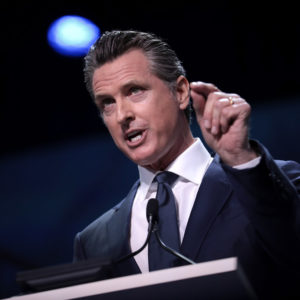Gov. Gavin Newsom’s office recently chided in a tweet: “Going out to eat with members of your household this weekend? Don’t forget to keep your mask on in between bites.” That was before he got in hot water for attending a large birthday party at an upscale Napa restaurant with no one wearing masks.
A career politician and powerful California Medical Association brass sipped $15,000 worth of wine while brokering the future of the state’s students, parents, workers and small business owners during the coming lockdown.
Voters are starting to see through politicians who say one thing and do another, as well as their nonsensical and unaffordable policies.
California went “blue” in the race for the Oval Office, predictably enough. Much more noteworthy, however, was Californians’ rejection of several ballot measures that would have raised taxes significantly.
On almost every proposition staked out by the governor, Californians said they’ve had enough.
Newsom was banking on Proposition 15, for example, to fund pet projects and backfill the state’s unfunded pension liabilities — benefits it owes state employees but can’t afford to pay out.
The ballot measure, with a few exceptions, would have amended the state constitution to allow commercial property to be taxed not at purchase price but at market value. A tax-weary electorate rejected the measure.
A healthy majority of Californians, in defiance of Assembly Bill 5, voted to classify gig workers as independent contractors instead of employees. The success of Proposition 22 will allow companies like Uber, Lyft and other app-based services to hire more workers and gives Californians the flexibility to supplement their income with earnings from the gig economy.
It will also prevent a price spike on app-based services. The services instead will remain more accessible to lower- and middle-class Californians who would otherwise be priced out of using services like rideshare and food delivery. At a time when people are endeavoring to limit their exposure to the coronavirus, decreasing access to these services is wrong and Californians agreed.
The swing to the center on ballot propositions stems from voters’ frustration with California’s government officials, who are all too ready to exploit Californians rather than develop commonsense solutions that deliver substantial return on investment for taxpayers.
State agencies and elected officials simply aren’t doing their jobs, as a recent report by the state auditor’s office about the Department of Toxic Substances Control shows.
The agency is entrusted with cleaning up dangerous waste, but the report found: “In the early stages of its cleanup effort, DTSC identified 50 properties — including child care centers, schools and parks — where lead contamination posed a particularly high risk to children who frequently spend time at these locations. Despite the risk these properties present, DTSC has yet to clean 31 of them. In fact, it has cleaned only one of these properties since May 2018.”
Voters are rejecting political leaders who don’t do their jobs, and this backlash extended down the ballot to congressional elections. Republicans Michelle Steel and Mike Garcia won contested seats, and Republican candidates lead in several other districts where Democrats were favored.
Voters are tired of gigantic tax and regulatory barriers that make it hard to open businesses and maintain a high quality of life. We are seeing movement toward more moderate stances on issues like taxation and labor law, even as Democrats retain control of the state legislature and governor’s mansion.
California has millions of moderate voters who want their elected leaders to deliver commonsense solutions to difficult problems.
These voters are clearly rejecting expensive, agenda driven, ineffective policies pushed by government officials who care far more about appeasing an activist base than reaching across party lines to create workable, solution-oriented policies.
Perhaps the next election cycle will see even more demand from California voters who expect much better leadership.

